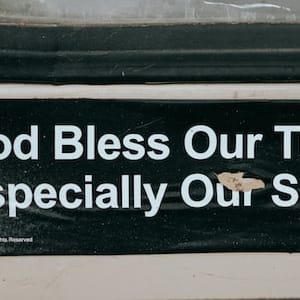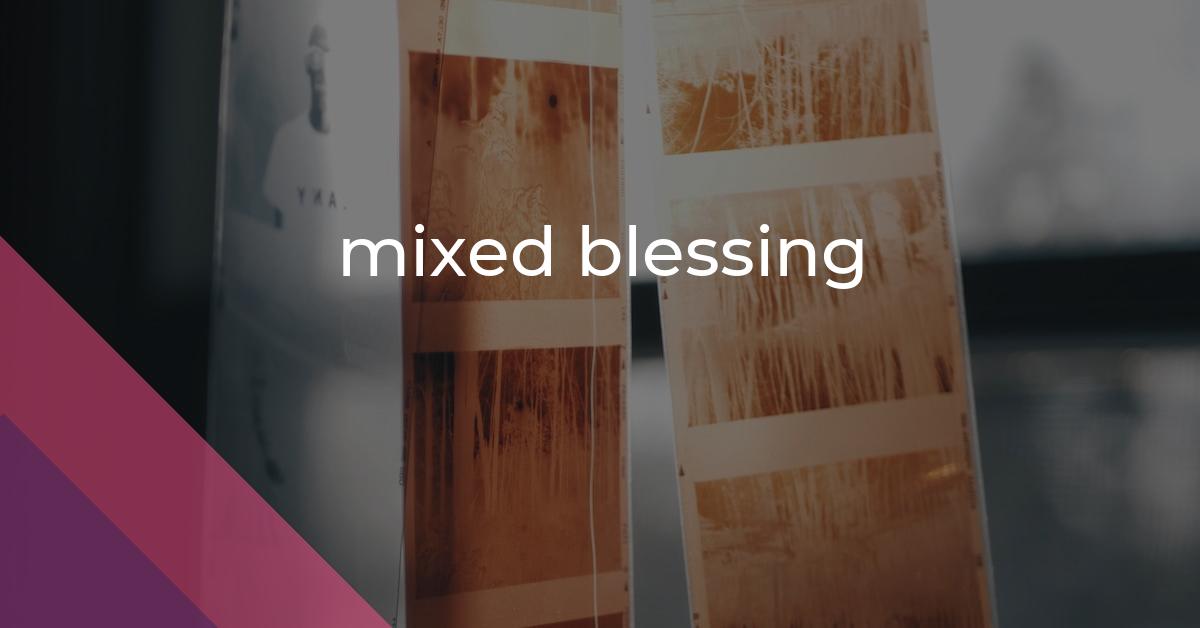mixed blessing: Idiom Meaning and Origin
What does ‘mixed blessing’ mean?
The idiom "mixed blessing" refers to something that has both positive and negative outcomes or aspects.

Idiom Explorer
The idiom "worst of both worlds" refers to a situation where someone experiences the negative aspects or disadvantages of two different options or scenarios, without enjoying any of the benefits or advantages.
The idiom "moment in the sun" means a brief period of fame, success, or recognition, often followed by a decline or being overshadowed by others.
The idiom "mix up" means to confuse or interchange things or people, leading to a misunderstanding or disorder. It implies a lack of clarity or organization in a situation. It is often used to describe situations where things or people are mistakenly combined or misunderstood.
The idiom "mix it up" means to vary or change something, often in order to avoid boredom or routine. It can refer to mixing up activities, ideas, or even people to bring about freshness and diversity.
The idiom "mixed picture" refers to a situation or outcome that is difficult to interpret due to conflicting or inconsistent factors, opinions, or information.
The idiom "mixed message" refers to a situation where someone is sending conflicting or contradictory information, making it difficult to understand their true intentions or meaning.
The idiom "mixed herbs" refers to a combination or assortment of different herbs, typically used in cooking, to enhance flavors and add complexity to a dish.
The idiom "mixed bag" means a collection of things or people that are diverse in quality, character, or suitability.
Paradoxical Blessings
The idiom "mixed blessing" is a commonly used phrase in American English. It refers to a situation or thing that has both positive and negative aspects. The idiom can be traced back to the 17th century and has its roots in religious literature.
The term "mixed blessing" combines the words "mixed," meaning a combination or blend of different elements, and "blessing," which refers to something that is beneficial or brings good fortune. This idiom is often used to describe circumstances that are ambiguous or have both advantages and disadvantages.
The concept of a mixed blessing can be found in various cultures and languages, but the specific idiom seems to have originated in the religious context. In religious texts, blessings are often described as positive outcomes or divine favors bestowed upon individuals. However, these blessings may not always be straightforwardly positive. They can come with challenges, difficulties, or unintended consequences.
One example of the idiom's usage can be found in the Bible. In the Book of Numbers, Chapter 11, verse 18, Moses says to the Israelites, "The LORD will give you meat, and you shall eat. You shall not eat just one day, or two days, or five days, or ten days, or twenty days, but a whole month, until it comes out of your nostrils and becomes loathsome to you; because you have rejected the LORD who is among you and have wept before Him, saying, ‘Why did we ever leave Egypt?’” In this passage, the provision of meat becomes a mixed blessing as it leads to excessive consumption and dissatisfaction among the Israelites.
The idiom "mixed blessing" is widely used in everyday conversations and written texts. It is often employed to express a nuanced view of a situation or to highlight the complexity of a particular event or outcome. For example, someone may say, "Winning the lottery was a mixed blessing. It brought financial security, but it also strained relationships and attracted unwanted attention."
In contemporary American society, the idiom is frequently used in various domains, such as discussing the effects of technological advancements, societal changes, or personal experiences. It allows individuals to convey the notion that something can bring both positive and negative consequences, challenging the perception of blessings as purely positive.
The idiom "mixed blessing" has become ingrained in the American English lexicon, reflecting the multifaceted nature of human experiences and the recognition that not everything that appears positive at first glance is entirely beneficial. It serves as a reminder that life and its outcomes are often complex and nuanced.
The idiom "mixed blessing" also relates to the phrase "best of both worlds". This phrase is used to describe a situation where someone has the advantages of two different things. It is often seen as a positive outcome, allowing individuals to enjoy the benefits of multiple options. For example, someone might say, "Having a flexible work schedule is a mixed blessing. On one hand, it allows for freedom and work-life balance. On the other hand, it can blur the boundaries between work and personal life."
Another related idiom is "mixed bag". This phrase refers to a situation or group of things that are of different types or qualities. It implies that there is a combination of positive and negative elements within the context. For instance, someone might say, "The conference was a mixed bag. There were some excellent presentations, but also some disappointing ones."
The idiom "cut both ways" is also connected to a mixed blessing. It means that something can have both positive and negative impacts, depending on the perspective or situation. It suggests that there are two sides to an issue or outcome. For instance, someone might say, "The new policy cuts both ways. It benefits some employees, but negatively affects others."
The phrase "worst of both worlds" can also be used to describe a mixed blessing. It refers to a situation where someone experiences the negative aspects of two different things or options. It conveys a sense of dissatisfaction or frustration with the outcome. For example, someone might say, "Being stuck in traffic and then getting caught in a rainstorm was the worst of both worlds."
Lastly, the idiom "go horribly right" is another way to express a mixed blessing. It suggests that something turns out unexpectedly well, but with potential negative consequences or complications. It implies that a seemingly positive outcome may have unforeseen drawbacks. For instance, someone might say, "The product launch went horribly right. We had a massive influx of orders, but our supply chain couldn't keep up."
Example usage
Example 1: When I lost my job, it was a mixed blessing - on one hand, I was no longer stressed out by the constant demands, but on the other hand, I had to find a new source of income.
Example 2: Moving to a bigger house was a mixed blessing for the Smiths - while they enjoyed having more space, they also had to deal with higher mortgage payments.
Example 3: Winning the lottery can be a mixed blessing - suddenly becoming wealthy may bring joy, but it can also attract unwanted attention and unanticipated challenges.
More "Ambivalence" idioms



